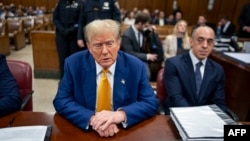A defense lawyer for former U.S. President Donald Trump laid the groundwork Thursday for a claim that Michael Cohen, likely to be the star prosecution witness against his former boss, is motivated by a desire for revenge.
The defense suggested at Trump’s New York criminal trial Thursday that Cohen, the defendant’s one-time lawyer and political fixer, turned against Trump because as the new president in 2017, he did not offer Cohen a White House job.
Cohen, who served 13½ months in federal prison for various offenses, including a campaign finance law violation that is critical in the case against Trump, is still to testify in the first-ever criminal case against a former president.
Trump is accused of illegally falsifying business records to hide Cohen’s $130,000 hush money payment to pornographic film star Stormy Daniels just before voters went to the polls in the 2016 election. Prosecutors say the goal was to keep her from talking about her claim that she had a one-night tryst with Trump a decade before, a liaison Trump denies.
Trump’s defense lawyers are contending that Cohen, in turning against Trump, is out for revenge against his former boss, that he had paid Daniels of his own volition, and that Trump was not involved. Trump claims that after he became president, he reimbursed Cohen in 2017, saying it was money he was owed for his legal work.
Yet a prosecutor introduced a tape of a phone conversation Cohen had secretly taped with Keith Davidson, Daniels’ lawyer, in negotiating the hush money payment, where Cohen told Davidson that Trump hates “the fact that we did it,” which Davidson said referred to the payment to Daniels.
Davidson had earlier testified that he never doubted that Cohen was trying to execute the deal with Daniels at Trump’s behest.
In addition, Cohen secretly recorded a call he had with Trump ahead of the election, in which Trump discussed details of a $150,000 payment to Karen McDougal, Playboy magazine’s 1998 Playmate of the Year.
McDougal has claimed that she had a monthslong affair with Trump in 2006 and 2007, which Trump has also denied.
Anticipating how Trump’s lawyers would likely attack Cohen when he testifies, prosecutor Joshua Steinglass had wanted jurors to first hear damaging information about Cohen through his own questioning. Steinglass elicited numerous accounts from Davidson about how volatile and demanding Cohen could be.
In one piece of testimony, Davidson said he received a phone call from Cohen in December 2016, not long before Trump took office as president.
According to Davidson, Cohen said he was despondent, quoting him as saying, “I can’t believe I’m not going to Washington,” an acknowledgment that Trump had not asked him to join his new administration.
On cross-examination by Trump defense lawyer Emil Bove, Davidson said about Cohen, “I thought he was going to kill himself.” Bove suggested that Cohen wanted to be named to a high-ranking position, even as high as attorney general, the top U.S. criminal justice position in the government.
In a withering cross-examination, Bove also sought to portray Davidson as something of a legal lowlife, a lawyer who specialized, as Bove said, in taking on Hollywood clients who wanted to “extract” money, something bordering on extortion, from celebrities who had something embarrassing to hide in their personal lives.
With the focus on Davidson’s legal work, Bove’s clear suggestion to the 12-member jury was that Davidson and Daniels had done much the same, attempting to hide her story of sex with a future president in exchange for money.
Davidson repeatedly denied the accusations from Bove and said he could not remember all the details of his legal work because over the years he said he has had more than 1,500 clients.
Earlier in the day, prosecutor Christopher Conroy sparred with another Trump lawyer, Todd Blanche, over whether the 77-year-old Trump should again be held in contempt of court for violating New York Supreme Court Justice Juan Merchan’s gag order prohibiting him from attacking witnesses and jurors in the case.
On Tuesday, Merchan ruled that Trump violated the gag order nine times, held him in contempt of court and fined him $9,000, a relative pittance for a billionaire like Trump, as Merchan acknowledged in his order.
The judge, after a 40-minute hearing, did not issue an immediate ruling on four more statements Trump has made. Among them were on-camera comments from last week in which Trump, the presumptive 2024 Republican presidential contender, disparaged the jurors hearing the case as Democrats deciding his fate.
Conroy told Merchan, “The defendant thinks the rules should be different for him.”
Trump defense lawyer Blanche suggested that Trump has to respond to reporters’ questions about the trial in a hallway outside the courtroom, but Merchan rejected Blanche’s contention.
“It was your client who went down to that holding area and stood in front of the press and started to speak,” Merchan said. “It wasn’t the press that went to him. He went to the press. He didn’t need to go in that direction.”
Blanche then agreed that no one was forcing Trump to talk to reporters, drawing laughter in an overflow room where spectators are watching the trial on closed circuit television.
Even as Merchan ruled against Trump in the first contempt case, the judge warned Cohen and Daniels about their ongoing taunting public social media posts against Trump.




